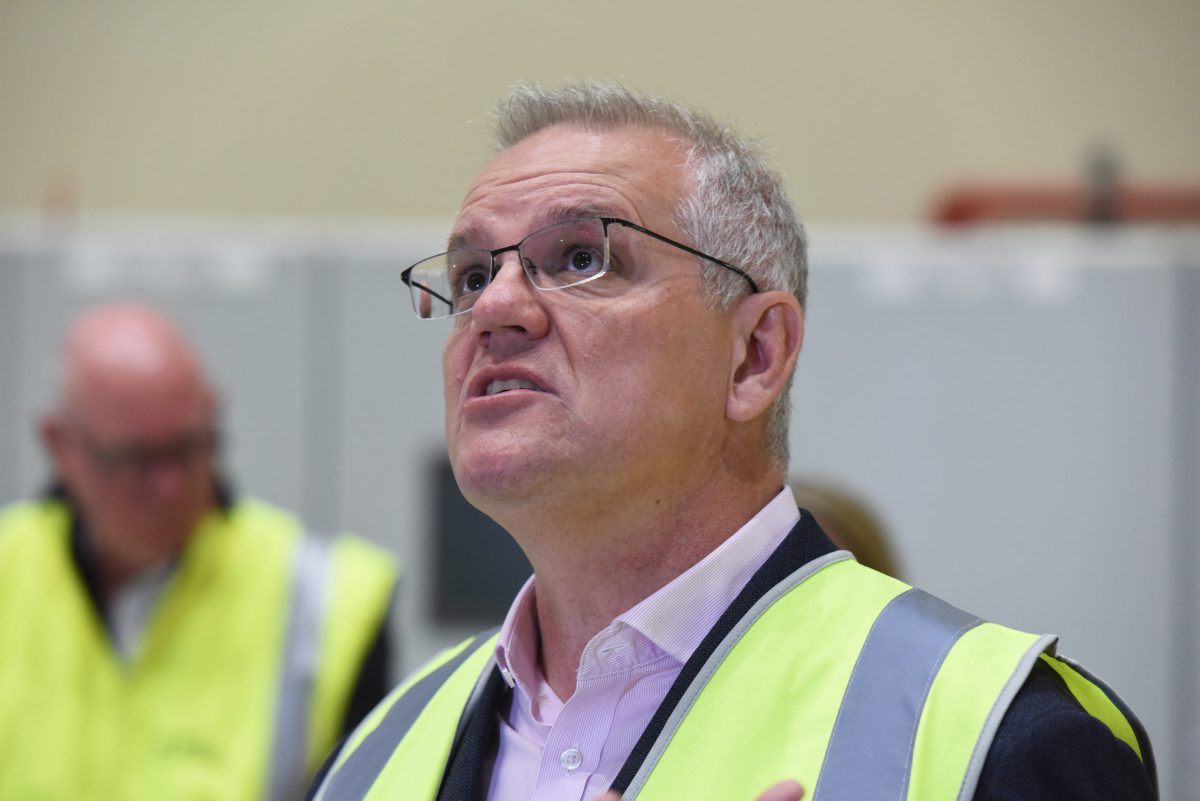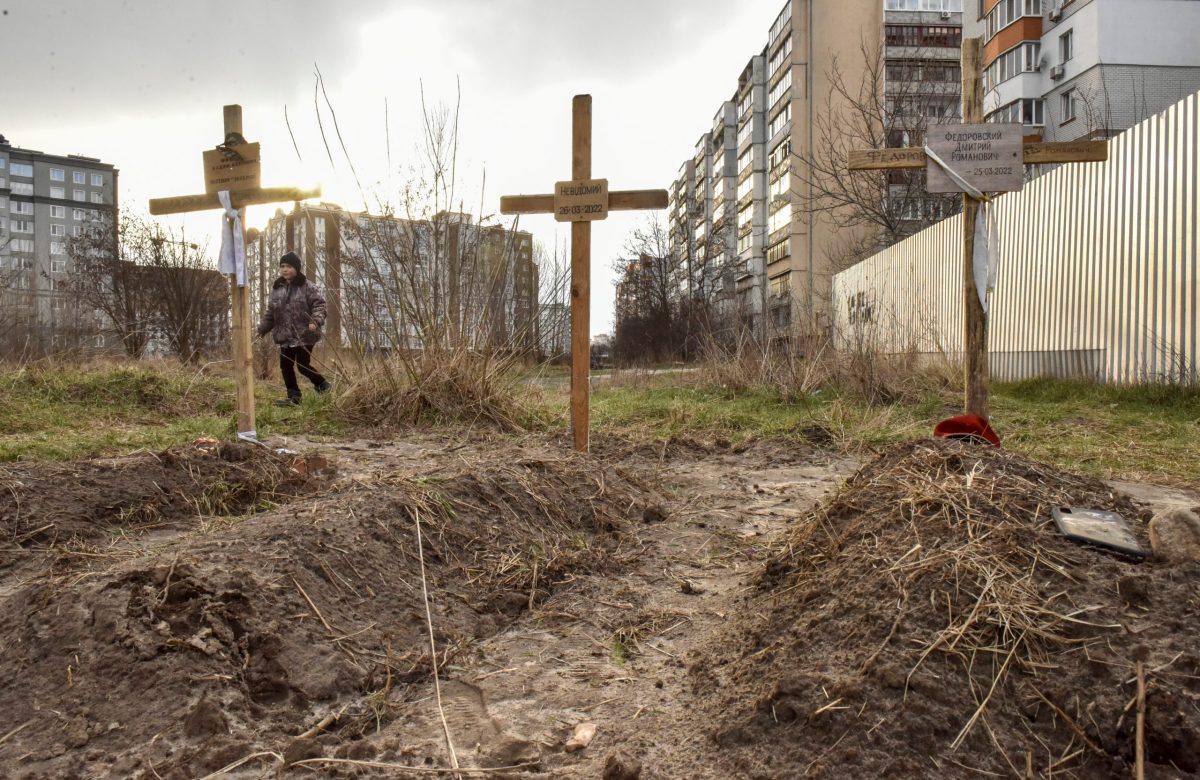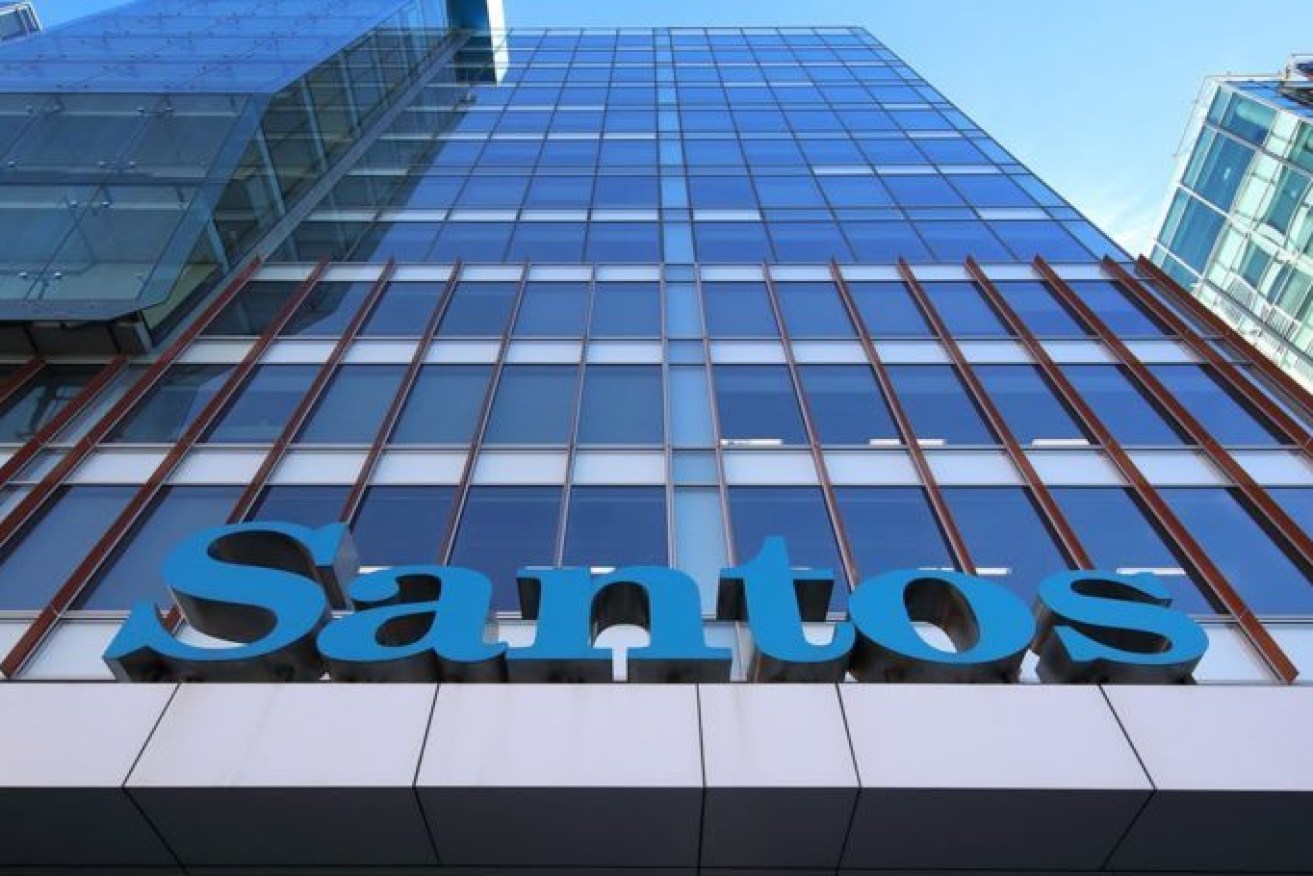- Santos secures licence for WA offshore oil discovery
- Malinauskas eyes private hospital beds as COVID cases spike
- Hot climate to stretch Adelaide hospitals
- Coalition support drops as Morrison attacks intensify
- Climate report a ‘file of shame’: UN chief
- Government appointments come under fire
- Russia faces global outrage over Bucha
Santos secures licence for WA offshore oil discovery
Santos has been granted a production licence for a major new project off Western Australia, which is being hailed as an important step for the nation’s oil security.
Federal Resources Minister Keith Pitt announced on Tuesday that Santos and its partner Carnarvon Energy now have a production licence covering the Dorado oil field, about 150km north of Port Hedland.
Two weeks ago, the Pavo-1 exploration well drilled 46km east of the Dorado field confirmed the area as one of the largest offshore oil discoveries on Australia’s North West Shelf.
Santos CEO Kevin Gallagher said the licence was an important step toward a final investment decision on the Dorado project, in the Bedout Sub-Basin in Australian waters.
Pitt said the “low emissions intensity development” would initially concentrate on oil production.
“This multi-billion project will enhance our oil security for the future,” he said.
“Given current uncertainty around the world we must maintain our focus on developing our traditional oil and gas along with new energy metals and materials.”
Santos has described Dorado as “a very low CO2 reservoir with approximately 1.5 per cent CO2”.
All gas will be reinjected in the initial phase, making it one of the lowest emission intensity oil projects in the region, according to the company.
Gallagher said oil and gas markets are seeing increased volatility and western countries are looking to diversify their supply sources away from Russia, one of the world’s leading producers.
“In this environment, Dorado and Pavo have the potential to bolster Australia’s national energy security while Australian LNG projects help to meet the energy needs of our allies,” he said.
Later production will recover natural gas for use in WA.
Malinauskas eyes private hospital beds as COVID cases spike
South Australia has recorded its highest COVID-19 hospitalisation rate since mid-February, prompting the government to consider taking over private hospital beds to ease pressure on the public system.
The number of COVID-positive patients in hospital jumped from 188 on Sunday, to 209 on Monday, including eight people in intensive care.
All up the state recorded 4595 new cases, but Premier Peter Malinauskas told reporters yesterday that the hospitalisation rate remained the metric of concern.
“We’re currently working within (hospital) capacity, but this is a push and this is a challenge and when we see hospitalisation numbers kick up by approximately 20 or thereabouts, that is another impact on the system,” he said.
“We do anticipate there’ll be another EMC (Emergency Management Council) meeting within this week and naturally if there’s more modelling to be assessed, more information to consider then we will do that.
“We’ll also rationalise that against the effort to increase hospital capacity, which remains an ongoing piece of work.”
[solstice_jwplayer mediaid=”bdwyXSs4″ sponsoroption=”352624″ /]
The Malinauskas Government last week announced 24 extra intensive care beds at the Royal Adelaide Hospital would be readied for use ahead of an expected surge in COVID-19 cases.
All up, the government plans to stand up 200 extra hospital beds in the short term to deal with a peak of up to 8000 cases a day expected later this month.
It has asked SA Health to report on how many beds are still needed to deal with the expected surge, following warnings the hospital system is already under “substantial strain”.
On Monday, Malinauskas said the government was now “actively pursuing” private hospital beds to deal with overflow from the public system.
“We are undertaking work with the private sector to see if additional beds we can get access to, to look after COVID-positive patients,” he said.
“At the moment there have been approximately 20 beds that have been identified within the private system that are being actively pursued.”
The premier said it was still a “live possibility” that South Australia would reach over 8000 cases each day, based on modelling undertaken by the University of Adelaide and released last month.
“The fact that we’re currently under that is a good thing, but remembering that the peak wasn’t anticipated to be reached until a few weeks’ time anyway,” he said.
“This is still an exercise of watching and acting accordingly if the variables change.”
Hot climate to stretch Adelaide hospitals
Heat-related health emergencies in Adelaide could almost triple over the next 30 years due to climate change, increasing financial burden and pressure on the hospital system.
Some 3600 people visited the city’s emergency departments for heat-related conditions from 2014 to 2017, costing $4.7 million, University of Adelaide research has found.
By the 2050s, heat-related emergency visits will reach 5200 over four years, under a best-case emissions scenario.
However, based on Australia’s current emissions rate, researchers expect that number could be as high as 9800.
This would add more financial stress onto Adelaide’s already-stretched emergency departments, with population growth expected to amplify these predictions.
Researchers estimate that by the 2030s heat-related emergency care will cost South Australia at least $7.4 million over a four-year period, rising to $10.5 million by the 2050s.
Better health service planning and mitigation strategies are needed to meet these challenges, the study said.
The results emphasised the importance of climate policies at a local, state and federal level to stabilise greenhouse gas emission at lower levels.
The study also underlines the need for comprehensive urban climate adaptation strategies to reduce the impact of rising temperatures.
While cold-weather related emergencies are expected to decrease, it found this will not outweigh the impact heat-related presentations will have on the system.
Coalition support drops as Morrison attacks intensify

Prime Minister Scott Morrison. Photo: Sarah Rhodes/AAP
Coalition disunity and revived questions about Prime Minister Scott Morrison’s character more than blunted the appeal of last week’s generous budget, according to the latest Roy Morgan poll released today.
The poll, conducted while Morrison faces accusations of bullying and racism, shows Labor extending its lead in the past week on a two-party preferred basis by 1.5 percentage points to 57 per cent to 43 per cent.
With an election campaign tipped to be called in less than a week, the poll has the Opposition ahead in all six states and regaining its momentum after a week in which public focus shifted onto damaging allegations against Morrison.
Labor’s primary vote rose over the week by four percentage points to 39.5 per cent, with the poll finding gains coming almost exclusively from independent candidates and minor parties.
Coalition primary support remains unchanged at 33 per cent.
The margin between the parties is expected to draw closer between now and election day, but the Roy Morgan poll shows the degree to which a divided government is struggling to dictate terms.
The internal tensions are unlikely to be resolved this week amid allegations the Prime Minister had dealt in racially charged politics were repeated on Monday evening.
Roy Morgan’s chief executive Michele Levine said the absence of a budget bounce showed that disunity was distracting voters from the budget’s pre-election message.
– James Robertson/The New Daily
Climate report a ‘file of shame’: UN chief
United Nations Secretary General Antonio Guterres has blasted politicians and businesses in the wake of a grave climate crisis assessment.
“It is a file of shame, cataloguing the empty pledges that put us firmly on track towards an unliveable world,” Guterres said of the new Intergovernmental Panel on Climate Change (IPCC) report.
“Climate activists are sometimes depicted as dangerous radicals. But the truly dangerous radicals are the countries that are increasing the production of fossil fuels. Investing in new fossil fuels infrastructure is moral and economic madness.
“Some government and business leaders are saying one thing, but doing another. Simply put, they are lying.”
The IPCC report said actions such as drastically cutting fossil fuel use, growing forests and eating less meat were needed to contain global warming to 1.5C above pre-industrial temperatures.
Despite climate change warnings issued by the Intergovernmental Panel on Climate Change (IPCC) since 1990, global emissions have continued to rise in the last decade, reaching their highest point in history.
The result: global emissions are on track to blow past the 1.5C warming limit envisioned in the 2015 Paris Agreement and reach some 3.2C by century’s end.
“We left COP26 in Glasgow with a naive optimism, based on new promises and commitments,” Guterres said.
“But current climate pledges would (still) mean a 14 per cent increase in emissions. And most major emitters are not taking the steps needed to fulfil even these inadequate promises.”
At this point, only severe emissions cuts in this decade across all sectors, from agriculture and transport to energy and buildings, can turn things around, the report says.
Even then, governments would also need to bolster efforts to plant more trees and develop technologies that could remove some of the carbon dioxide already in the atmosphere after more than a century of industrial activity.
Government appointments come under fire
The Morrison government has come under fire for appointing former Liberal MPs and coalition staffers to high-paying roles on the Administrative Appeals Tribunal, just days out from the election being called.
Former NSW family and community services minister Pru Goward and former WA state MP Michael Mischin were among two of the 19 appointments to the tribunal made by Attorney-General Michaelia Cash on Monday.
Prime Minister Scott Morrison’s former chief of staff Ann Duffield has also been given a role, as has Cheryl Cartwright, who is a senior advisor to Foreign Minister Marise Payne.
Another former WA Liberal, Peter Katsambanis, was also among the appointees to the body.
The appointments have attracted criticism from the opposition for politicising the tribunal and giving high-paying roles to party faithful.
Mischin, who has been given the role of the tribunal’s deputy president, will receive a salary of almost $500,000 a year as part of the new position.
Shadow attorney-general Mark Dreyfus said the appointments were all about political favouritism.
“Rather than calling the election, the Morrison government is hanging on to power so they can hand out as many lucrative, taxpayer funded jobs to themselves and their mates,” he said.
“While Australian families struggle with the cost of living and stagnant pay packets, Scott Morrison is throwing around cushy $400,000 a year jobs to former Liberal MPs and staffers.”
Senator Cash said all of the appointments made to the tribunal were highly qualified.
“The government is committed to ensuring the tribunal is well-placed to deal with its increasing caseload,” she said.
“These appointments will provide the tribunal with more resources to conduct high quality merits review with minimum delay.”
The coalition has made a rush of appointments to government bodies, just days out from the federal election being called.
Monday also saw announcements of appointments to the Australian Competition Tribunal, and Australia Council board, as well as the Federal Circuit and Family Court.
Russia faces global outrage over Bucha

Graves in front of a residential building in Bucha city, which was the recaptured by the Ukrainian army. Photo: Oleg Petrasyuk/EPA
Russia is facing a fresh wave of condemnation after evidence emerged of what appeared to be deliberate killings of dozens if not hundreds of Ukrainian civilians.
The grisly images of battered bodies left out in the open or hastily buried led to calls for tougher sanctions against the Kremlin – namely a cut-off of fuel imports from Russia.
Germany reacted by expelling 40 Russian diplomats and US President Joe Biden said Russian leader Vladimir Putin should be tried for war crimes.
“This guy is brutal, and what’s happening in Bucha is outrageous,” Biden said, referring to the town northwest of the capital that was the scene of some of the horrors.
Ukrainian President Volodymyr Zelenskyy left the capital, Kyiv, for his first reported trip since the war began nearly six weeks ago to see for himself what he called the “genocide” and “war crimes” in Bucha.
He said dead people had been “found in barrels, basements, strangled, tortured.”
Later, in a video address to the Romanian parliament, Zelenskyy said he feared there were places where even worse atrocities had occurred.
“The military tortured people and we have every reason to believe that there are many more people killed,” he said. “Much more than we know now.”
Russian Foreign Minister Sergey Lavrov dismissed the scenes outside Kyiv as a “stage-managed anti-Russian provocation.”
Kremlin spokesperson Dmitry Peskov said the images contained “signs of video forgery and various fakes.”
Russia similarly rejected previous allegations of atrocities as fabrications on Ukraine’s part.
Ukrainian officials said the bodies of at least 410 civilians have been found in towns around Kyiv that were recaptured from Russian forces in recent days.
The Ukrainian Prosecutor-General’s Office described one room discovered in Bucha as a “torture chamber.”
In a statement, it said the bodies of five men with their hands bound were found in the basement of a children’s sanatorium where civilians were tortured and killed.
– With AAP, The New Daily and Reuters





